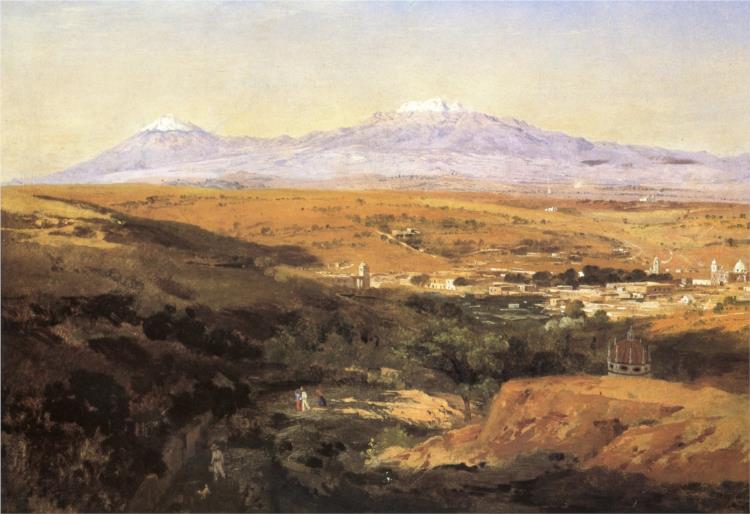Description
The work "Vista of the city of Tlaxcala" by José María Velasco, created in 1874, stands out as one of the most eloquent manifestations of landscape romanticism in Mexico. Velasco, key at the Mexican School of Painting, specializes in capturing the essence and beauty of Mexican landscapes, and this specific piece is no exception. In it, the artist presents a panoramic view of the city of Tlaxcala, framed in a natural landscape that masterfully combines the monumentality of urban architecture with the wealth of the natural environment.
The composition is structured so that the spectator is guided from the forefront, where elements of the local flora are perceived àso and vegetation that provide a sense of depth towards the vast horizon that extends in the background. In the center, the city of Tlaxcala rises with its buildings, where the combination of earth and ocher colors reflects the warm Mexican sunlight. The representation of the city, at the same time energetic and serene, denotes an almost photographic precision, a distinctive feature of Velasco's style.
The colored palette used by Velasco is rich and varied, predominantly the warm tones that evoke the natural midday light, as well as the nuances that suggest the shadow and relief of the landscape. The clouds that move in the sky add a sense of movement and temporality, contrasting with the firmness of the city and its surroundings. This color and light management is fundamental in the work of Velasco, who seeks not only the physical representation of the places he captures, but also an emotional connection with the viewer.
A notable aspect of "view of the city of Tlaxcala" is the absence of human figures, which is characteristic in many of his works; This decision can be interpreted as an attempt to achieve a more intimate conversation between the viewer and the landscape. This emphasizes the role of the natural and urban environment as absolute protagonists, which reinforces the idea that the beauty of nature and architecture must be appreciated in its purest and essential form.
The choice of Velasco of Mexican landscapes, in a period of social and cultural transformation, also reflects its interest in national identity and the valuation of indigenous inheritance. Velasco's works are not only landscapes, but also a ballet of history and culture, highlighting the traces of civilization within a vibrant nature.
In the context of nineteenth -century Mexican art, "view of the city of Tlaxcala" The light, and a deep emotional connection with the landscape. Thus, José María Velasco establishes, through works such as this, as a visual chronicler who underlines the greatness of the natural and architectural heritage of Mexico, inviting observers to contemplate the unwavering beauty of their land.
KUADROS ©, a famous paint on your wall.
Hand-made oil painting reproductions, with the quality of professional artists and the distinctive seal of KUADROS ©.
Art reproduction service with satisfaction guarantee. If you are not completely satisfied with the replica of your painting, we refund your money 100%.

